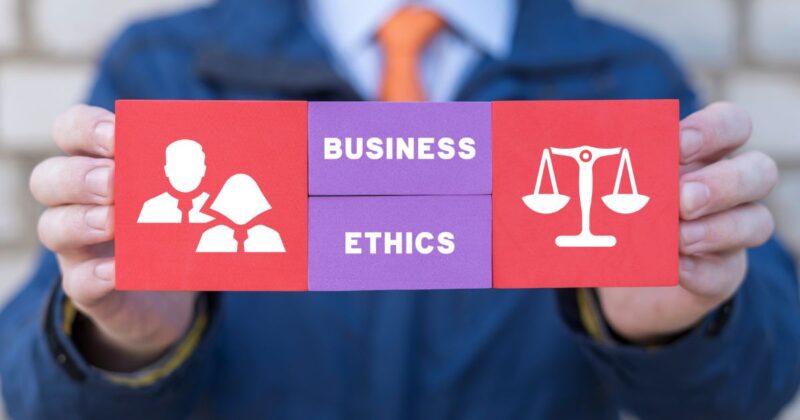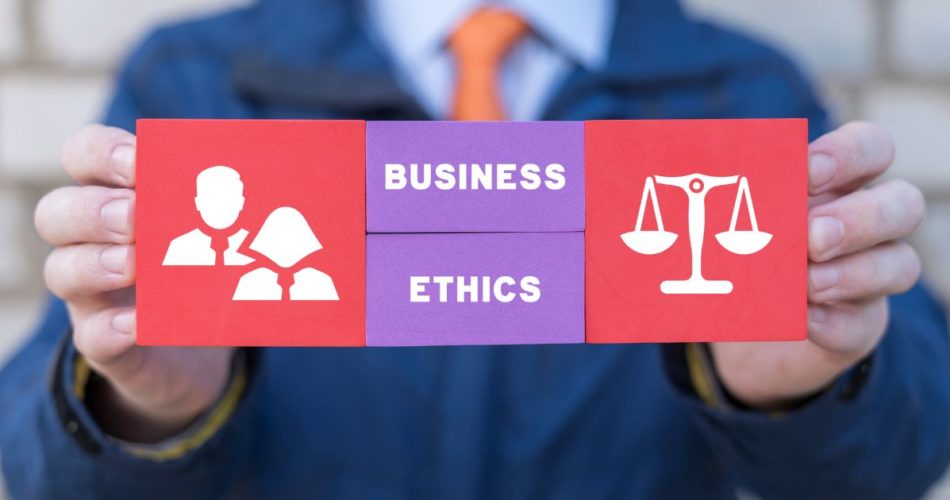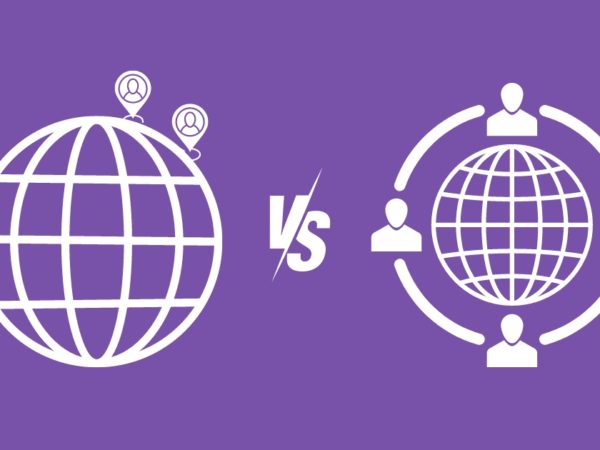
Business ethics are critical for organizations, helping them make wiser decisions in situations of controversies, dilemmas, and ethical issues.
However, business ethics are often overlooked.
Companies with unethical and unprofessional behavior could lead to sudden downfall without prior notice.
Organizations and employees face many ethical issues related to power, age, looks, gender, false products, bad service, bad behavior, and so on.
So, if you want to gain trust and loyalty from customers, investors, and clients, you need to follow different principles of business ethics in your organization and train your employees to follow them strictly.
Business ethics include certain norms or standards that organizations and employees need to follow in their processes like manufacturing, production, objectives, techniques, and practices.
In this article, I’ll discuss business ethics in detail, its principles, components, implementation, benefits, some real-life examples, and.
Let’s start!
What Are Business Ethics?
Business ethics is a set of standards or principles that examines ethical or moral problems in a business environment. It establishes the relationship between practices, objectives, and techniques of an organization.
Ethics originated from organizational statements, individual statements, or the legal system. Thus, ethics refers to the study of ethical or moral behavior and defines what is wrong and what is right in an individual’s behavior by judging based on the standards of moral conduct.
Business ethics says that businesses need to be honest with the society. Ethical behavior includes fair treatment of workers, good quality products and services, fair price of the product and service, reasonable profit margin, and fair weights of the product.
However, unethical behavior includes misleading advertisements, showing a false image of a business, revealing trade secrets, using assets for personal use, and more. An organization or an individual is said to be ethical if they act morally and serve society’s interest with value. This will build trust among the public and lead to success.
Types of Business Ethics
#1. Meta-Ethics
Meta ethics encompasses the meaning and origin of all ethical concepts and philosophies. It analyzes the properties, words, foundations, scope, and status of all moral values. It basically defines morality based on certain theories.
#2. Normative Ethics
Normative ethics tells what’s right or wrong morally based on certain rules and principles. It will guide you to form the business ethics of your company that are suitable and practical for your specific business instead of relying on just theories.
#3. Virtue Ethics
To run a business ethically, you must focus on certain virtues or morals like honesty, truthfulness, etc. Your intentions must be good toward everyone you work with – your employees, clients, vendors, etc. not just making profits. It will help you maintain trust and continue business relationships with them for longer.
#4. Utilitarian Ethics
Utilitarian ethics involves implementing the principles of business ethics, like transparency, fairness, compassion, etc., to different scenarios where they are applicable. With these ethics, you can find effective solutions to issues and make better business decisions.
#5. Descriptive Ethics
Descriptive ethics are values describing the ethical ways a business must behave and operate. They must figure out the result of every action and decision they make beforehand, implementing only those that are ethical.
#6. Deontological Ethics
Deontological ethics encourage a business to always go by the code of conduct it has created based on moral grounds. This means the business must follow business ethics no matter what the situation is or its consequences. Even if the result is bad for the business, the ethics must be applied anyway.
#7. Communitarian Ethics
Communitarian ethics involve certain responsibilities that a business has toward the industry it operates in as well as to society and the environment. These ethics help a business create a sense of community in the industry and enable it to understand the probable consequences of its actions on others.
Principles of Business Ethics
Loyalty
Employees represent a company. Each one of them must be loyal to the company and its clients, customers, partners, suppliers, and among one another. They must never disclose confidential information to anyone else, even to people in the same organization, as different levels or roles of employees have access to different data and permissions.
Respect
No matter what level or job role an employee possesses in a company, they must respect others and deserve respect from others as well. Even if you hold a high rank in a company, you must not treat others as inferiors and disrespect them by any means. Similarly, lower-level employees must not only respect mid- and high-level employees but also those from their ranks.
Honesty
Everyone in the company must be honest with each other, no matter the situation or outcome. All must be dedicated to telling the truth through their words and actions. Whether it’s good news or bad, you must deliver it to the concerned personnel. Also, telling the truth means sharing the complete information without leaving out anything or misrepresenting it in some way.
Leadership
A good leader guides everyone in the team and works towards the benefit of the organization they work for. Business leaders, decision-makers, and other key stakeholders in a company must set an example for others by exhibiting ethical behavior. It’s possible with ethical decision-making, seeking feedback and improving, enhancing efficiency, caring for employees, and so on.
Fairness
Ensure fairness in your organization in every process and people. Whether it’s low-level employees or high-level executives, in-house members, or outside contractors, treat everyone fairly. Keep on monitoring so that no one can exercise their power to cause others any harm or exploit their weakness. Make sure everyone gets equal opportunities without any discrimination based on their gender, religion, demographics, etc.
Integrity
Your business must cultivate the virtue of integrity by keeping promises, building trust, and fulfilling commitments. You must provide all that you have promised at the right time to your clients, employees, and other associates if you want to maintain trust and look for long-term business relationships.
Transparency
Be transparent about your policies, processes, and work status with your clients, employees, and investors. They must know essential information about the project they are associated with. It could be project requirements, methods used, deadlines, costs, work progress, etc. This transparency will reduce conflicts and unrealistic expectations. Instead, it will foster mutual trust and longer business relationships.
Accountability
Let everyone in your business know that they are fully accountable for their actions and decisions. They must know that they can affect other employees, customers, the environment, and society in some way through their actions. This way, your employees and other associates will be conscious when making decisions and taking action.
Responsibility
Every employee is given some responsibility in an organization. Ensure that they understand their responsibilities well and take on each task with full dedication. This will help them follow the code of conduct and implement best practices to yield the best results and satisfy customers as well as investors.
Compassion
Compassion is an underrated but important principle of business ethics that everyone in your company must follow. You never know what a person is going through, so be caring and kind toward each other, irrespective of your rank and power.
You must also make efforts to understand the issues of your employees and customers and find ways to solve them. In addition, your business must be compassionate toward society and all living beings and must handle sensitive topics with empathy.
Environment Consciousness
We all share a common planet along with its resources and environment. Thus, it’s highly necessary to care for what’s good for your environment in order to counter climate change. Implement green business practices like the 3Rs (reduce, reuse, and recycle), minimize resource depletion, increase energy efficiency, and lower carbon emissions.
Low-Adherence
Ensure your business adheres to applicable laws and regulations in your region or country and industry. It could be labor law, safety standards, data privacy regulations, etc. You can improve your operations, processes, and policies accordingly to avoid penalties while enhancing your reputation and safety.
Components of Business Ethics
#1. Upper Management
The upper-level management in the company includes the chairman, director, C-Suite executives, managers, and other key decision-makers. They must ensure to implement business ethics to themselves first. This will set an example for your employees and other associates, so they will be encouraged to follow business ethics.
#2. Involve Employees
Not only the upper management but mid-level and lower-level employees can also provide crucial inputs when forming business ethics. In addition, you can also discuss certain points with a smaller employee group and analyze how they react to those points. So, involve all your employees in this process so it becomes easier for you to implement policies at all levels of your organization.
#3. Create and Publish a Code of Conduct
Considering business ethics and values, you must create a code of ethics that everyone in your organization must follow, from lower-level executives to upper management. Formulate your policies in writing and distribute them to everyone. This code can cover areas like moral ethics, workplace safety, producing and maintaining high product quality, complying with laws, ethical marketing, correct financial reporting, etc.
#4. Check Compliance
Apart from implementing a strict code of conduct, you must also ensure all the employees and associates follow it. Also, check whether your processes, techniques, tools, and other components align with applicable standards.
#5. Evaluate Results
Evaluating the result of your ethics program is necessary to check whether the policies are being followed and their impacts on the overall organization. Although it’s difficult to do it since the policies are based on values and morals, you can still measure the results to find if employees are working as per the business ethics you have defined.
Real-Life Examples
There are plenty of examples that show how implementing business ethics can help a business grow.
#1. Patagonia
Patagonia is an outerwear brand that built its business with the idea of encouraging customers to “buy less”. This unconventional approach helped them establish a good reputation as an environmentally conscious, ethical company.
To further drive loyalty from buyers, they started supporting various sustainable initiatives like providing free repairs, using organic cotton for their materials, donating 1% of annual sales to environmental causes, etc.
#2. Toms
Toms is a popular apparel and footwear brand. It centralizes the branding with the commitment to social and environmental philanthropy, ensuring that customers know about its brand values every time they purchase any product from them.
Toms initiated an instance of “one-for-one”, which means they will donate shoes to needy children in a developing country every time their product is purchased. It also partnered up with the “Water For People” initiative to offer safe water in developing countries.
#3. Conscious Coffees
Conscious Coffees has built a solidified reputation that has implemented the principles of ethical production and marketing. This initiative is taken by fellow cyclists to help other cyclists refurbish, repair, and maintain used and old bicycles.
The brand has established multiple socially conscious and sustainable initiatives. In addition, it donates coffee regularly to the Community Cycles Program.
Benefits of Implementing Business Ethics
The company that operates ethically draws more attention and customer trust as compared to the company that doesn’t. It also impacts long-term and short-term profitability.
Here are the benefits of implementing business ethics in your organization.
- Competitive advantage: Happy customers drive your revenue and sales. When your business runs ethically, you will gain more customer attention as well as loyalty to the products and services you are offering.
- Attract investors: Investors play a crucial role in your business growth by raising funds. Before making an investment, the investor needs to realize that your company is working ethically and adding value to its products and services to attract more customers.
- Avoid lawsuits: Unethical behavior will become more expensive for organizations since they may need to pay huge fines or face lawsuits.
- Stronger collaboration: With business ethics implemented, team members working together in a company show respect to each other, which leads to lower friction, better communication, and higher productivity.
- Improved reputation: A company, when it behaves ethically, creates a positive image in the eyes of customers, which leads the business to success.
How to Implement Business Ethics
Let’s discuss some steps that you can take to implement business ethics in your organization.
- Code of ethics: Assurances for policy support are the major element of a code that includes organizational leadership, expectations based on ethical issues, practical guidance on commitments, decision trees or scenarios, for example, Q&As, consequences of misconduct, details of code, and more.
- Supporting context: This step involves “ethical architecture” in place to implement a breathing and living code. This architecture contains policies and regulations outlined in supplier agreements and employee contracts.
- Training: Newcomers and existing employees must know about the codes. So, an organization should give training to its employees to let them work under the ethics policies.
- Accountability and Monitoring: Organizations must arrange effective speak-ups for everyone, like anonymous helplines. To this, contractors, employees, and others who are connected with your organization directly or indirectly can raise concerns privately about unlawful, unethical, and unsafe practices.
- Communication campaigns: To engage employees, communication campaigns are necessary to implement. This allows everyone to communicate the company’s ethics policy.
Challenges
- Harassment and discrimination: These are the most common challenges that managers, HR professionals, and employees face in their day-to-day professional lives, especially women. This impacts the reputation and outcomes of an organization. Some discrimination areas are age, disability, pregnancy, religion, race, pay grades, and gender.
- Accounting practices: Unethical accounting practices can lead to serious issues such as friction, disharmony, etc. So, organizations are required to keep accurate accounting practices.
- Workplace safety: Everyone in the organization has the right to work safely under different conditions. This includes hazard communication, lockout, ladders, lifts, and more. Due to improper communication of these policies, employees can face both physical and mental health issues, such as wounds, accidents, stress, psychological risks, fear, and more.
- Fraud: It is one of the major ethical challenges that can have a huge impact on your organization. It can affect your investors, employees, customers, reputation, and your bottom line.
Conclusion
Competition is high in every sector and region in modern times. But consumers seek high-quality and trustable products and services as always.
So, businesses that follow ethical practices have higher chances of building greater trust and loyalty with their customers. This will lead to higher productivity, fewer issues while communicating and collaborating on a project, and increased revenue.
Next, you may read about Compliance SOC 1 vs. SOC 2 vs. SOC 3.



